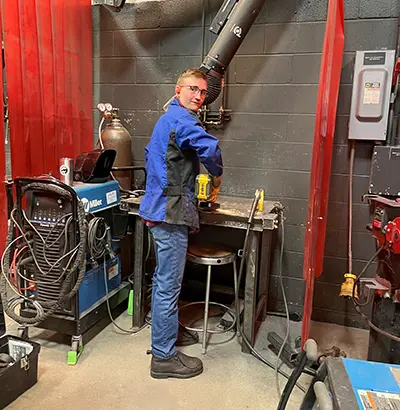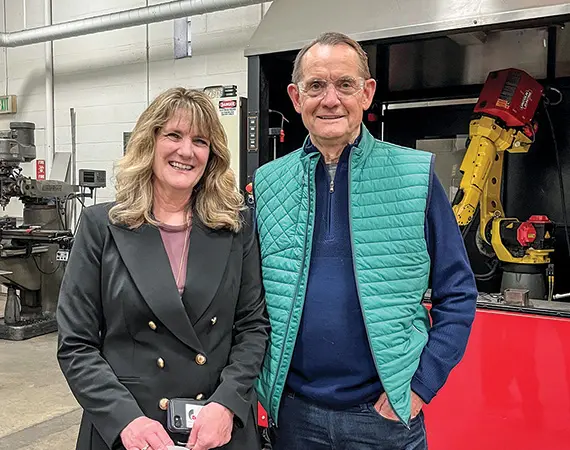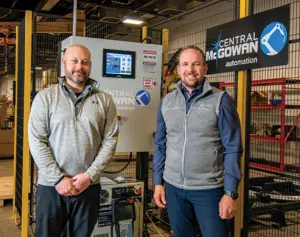Of the seven regions of Minnesota included in the most recent State of Manufacturing® survey, respondents in the St. Cloud region expressed more concern than any other area of the state about the persistent worker shortage, with 59% of those surveyed saying attracting workers is a top concern. For those area manufacturers, Lori Kloos’s appointment as the new president of St. Cloud Technical & Community College (SCTCC) comes just in time.
Kloos is eager to work with local employers to address that concern. A product of three Minnesota State institutions, Kloos has spent most of her career at SCTCC, serving as vice president of administration and chief financial officer from 2000-2022. She was named president in January.
In addition to knowing the college and the Minnesota State system from all sides, Kloos’s strong ties to the community enhance her ability to gather input from industry leaders as SCTCC continues to offer dynamic programs that benefit students and employers in the region’s economy.
Assessing employer needs
With 4,500 students enrolled in its credit programs and others in customized training and non-credit programs, SCTCC plays a critical role in educating future employees for the St. Cloud region. It’s vital, Kloos believes, that all of those programs reflect employers’ needs.
Kloos is particularly concerned about addressing employer demands in the labor market. “You look at the economy right now and the need for more and more skilled employees. How do we provide more? How do we respond quickly? We have to continue to work collaboratively and do it quicker and be more proactive,” she says.

That’s why SCTCC has created industry advisory boards to develop programs. Board members involved in manufacturing work directly with SCTCC’s dean of skilled trades and faculty in specific programs, from welding and mechatronics to computer-aided drafting/design and energy and electronics.
The college’s close ties to industry have also been instrumental in its ability to expand and upgrade facilities. SCTCC recently received a $2.5 million grant from the U.S. Economic Development Administration for its advanced manufacturing lab.
SCTCC is adding another $2 million to the lab for cutting edge equipment, such as SCADA robotics equipment.
“We’re bringing in industry partners to give input on what else is needed in the lab,” Kloos says.
SCTCC also takes its programs directly to area manufacturers through customized training. For example, SCTCC faculty have developed on-site welding training for new employees at New Flyer, the largest transit bus manufacturer in North America.
Tapping the future workforce
An equally critical role for SCTCC is to promote careers in manufacturing to the next generation of employees and show how SCTCC can help prepare them for the future.
Kloos’s vision is to share more of what the college offers and get people excited about visiting and learning about “what they don’t see when they just drive by the campus.”
SCTCC has accomplished that outreach in part through unconventional programs. High school students, for example, can take a college-level manufacturing and engineering class from SCTCC instructors at Cold Spring USA, a natural stone manufacturing facility and bronze foundry in Cold Spring. The class enables students to see how their newly-acquired skills apply in real life circumstances, and the credits they earn can transfer to SCTCC. For the company, those students might look around and see themselves working there in the future.
SCTCC also cosponsors high-visibility events, such as Minnesota’s VEX Robotics Competition for elementary through high school students. “Our manufacturing sponsors make it happen because they see the importance of the skills students are learning,” Kloos says.
A virtuous circle results from SCTCC’s partnerships with manufacturing. Industry partners sponsor programs that help attract future employees to manufacturing, which draws attention to and boosts enrollment in SCTCC’s programs. After students have finished programs in the college, SCTCC’s goal is to place them in positions in local companies. “They will hopefully stay right here in our region and contribute back to our economy,” she says.
Unconventional outreach
Kloos believes that St. Cloud’s diverse population allows SCTCC to share the value of skilled trades with prospective students beyond the traditional pipeline from high schools.
“Typically, we have not seen as diverse a population in skilled trades. We want to look at how we’re introducing opportunities to enter these career fields and create pathways to these great jobs,” she says, adding that diversity, equity and inclusion for students, faculty and staff have become a top priority within the college.
Sometimes a totally new approach is the best way to reach diverse groups. A few years ago, the college started an annual tradition that has grown into a full-blown showcase of the programs SCTCC offers.
“Brewlash” (rhymes with goulash) began as a hot dish event sponsored by the culinary arts department. Then the college secured a one-time liquor license to open up its medium-heavy truck lab for beer and wine tasting.
After a hiatus during the pandemic, Brewlash has taken off. This year’s event featured charcuterie boards prepared by the culinary students, presented on platters designed and created by welding students, and enjoyed around tables crafted by carpentry students.
High praise from peers
Kloos draws high praise from area leaders. Joe Mulford, president of Pine Technical and Community College in Pine City, for one, says her commitment to the region and her background in administration makes Kloos a perfect fit for the college.
“Her family’s there, and her kids grew up there. She really understands the community and brings that perspective, as well as her vast technical knowledge about the operations of not only that campus, but our system,” Mulford says. “She really knows everything, from labor contracts to revenue funding models and where the business operations need to be.”
Matt Varilek, president of the Initiative Foundation, a non-profit that offers loans, grants, and donor services in the region, shares Mulford’s enthusiasm. “Lori has been essential to our partnership,” he says. “The college is a critical partner in so much of our organization’s efforts related to workforce development in general, and the child care workforce in particular.”
Varilek also admires Kloos’s tenacious outreach, citing her roles on the Greater St. Cloud Development Corporation, United Way Partner for Student Success, and the St. Cloud Rotary Club. “Lori is actively gathering input from partners and bringing those insights to her leadership of the college,” he says.



